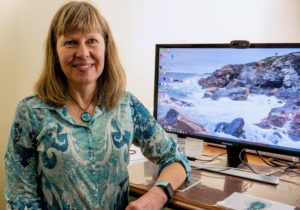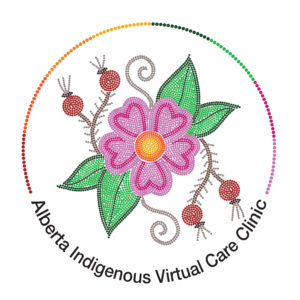
— Photo supplied by Dr. Sonya Regehr
Nearly 1,240 Indigenous Albertans met with physicians in a new virtual clinic during its first year of operation.
The Alberta Indigenous Virtual Care Clinic (AIVCC) opened in December 2020 as another option for Indigenous people to access medical appointments.
Since then, more than 3,000 physician visits have been arranged.
“It’s a strong team that we have at AIVCC and it’s been a joy to start the clinic over the past year and have that service available for Indigenous people in Alberta,” said clinic manager Michelle Hoeber, reflecting on the growth of the clinic in its first year.
“It’s been rewarding to hear feedback from [patients.] We had a lot of new patients in the beginning, because we were a new service, and now we’re having quite a few returning patients,” she said.
“People must be getting the services that they need because they’re coming back.”

— Logo supplied by the Alberta Indigenous Virtual Care Clinic
A new program for the province, AIVCC grew from the concerns of doctors already working within Indigenous communities. Accessibility has always been an issue and with COVID-19 putting even more strain on an already limited resource, the program was welcomed by communities and proved educational for doctors.
“For myself, being a physician who has only ever worked in the southern half of the province, [it was rewarding] talking to patients in the northern half of the province and feeling like we were helping people in communities that are quite under serviced,” said Dr. Sonya Regehr, medical lead for AIVCC, and one of 17 physicians who worked with the clinic in its first year.
“What I had to learn about was resources, especially in the north,” she explained.
The AIVCC service is available to any self-identifying Indigenous person as well as their families. Over the past year, AIVCC health-care professionals saw patients from both urban and remote parts of the province, including as far north as Fitzgerald, an unincorporated Alberta community roughly 20 km from the Northwest Territories.
“In some of these under serviced communities, doctors are very busy and they’re often seeing patients in the emergency department and can only deal with one issue,” said Regehr.
“Being a physician who has only ever worked in the southern half of the province, [it was rewarding] talking to patients in the northern half of the province and feeling like we were helping people in communities that are quite under serviced.”
— Dr. Sonya Regehr, medical lead for the Alberta Indigenous Virtual Care Clinic
The virtual clinic’s schedule allows 30 minutes for each appointment to give patients and doctors more one-on-one time.
“I find that patients really appreciate having a place where they can talk about all of their [concerns] as a whole.”

—Photo supplied by the Alberta Indigenous Virtual Care Clinic
Although the program initially started as a way to help Indigenous communities during COVID, over the last year AIVCC physicians most often handled cases regarding other concerns such as chronic disease management, and requests for mental health support.
“[One-in-four patients came forward with] a mental health concern or a mental wellness question, some to a chronic [degree] where they might need a referral to see a psychiatrist,” said Hoeber, explaining why the clinic decided it was time to expand the services AIVCC offered.
Doctors previously referred patients to professionals outside of the virtual clinic, but organizers hope with the addition of a psychiatrist, psychologist, and mental health therapist will lead to more seamless care.
“Working as part of a team is so much more effective and enjoyable,” said Dr. Katharine Hibbard, a consulting psychiatrist who joined AIVCC in November 2021 after previously working with the organization through referrals.
“Mental health care takes a team approach. Many aspects of a person’s life can affect mental health.”
To learn more about the AIVCC team, including the doctors working within the organization, hours of the clinic, and appointment availability, call 1-888-342-4822, email info@aivcc.ca, or visit them at https://aivcc.ca/.
— Lesley Allan
